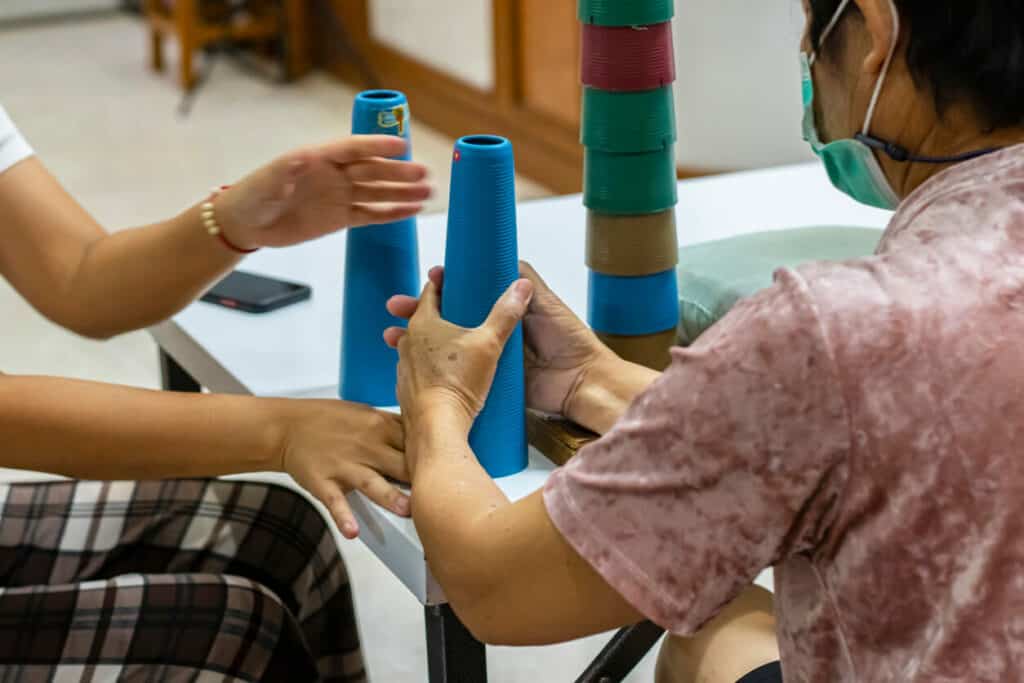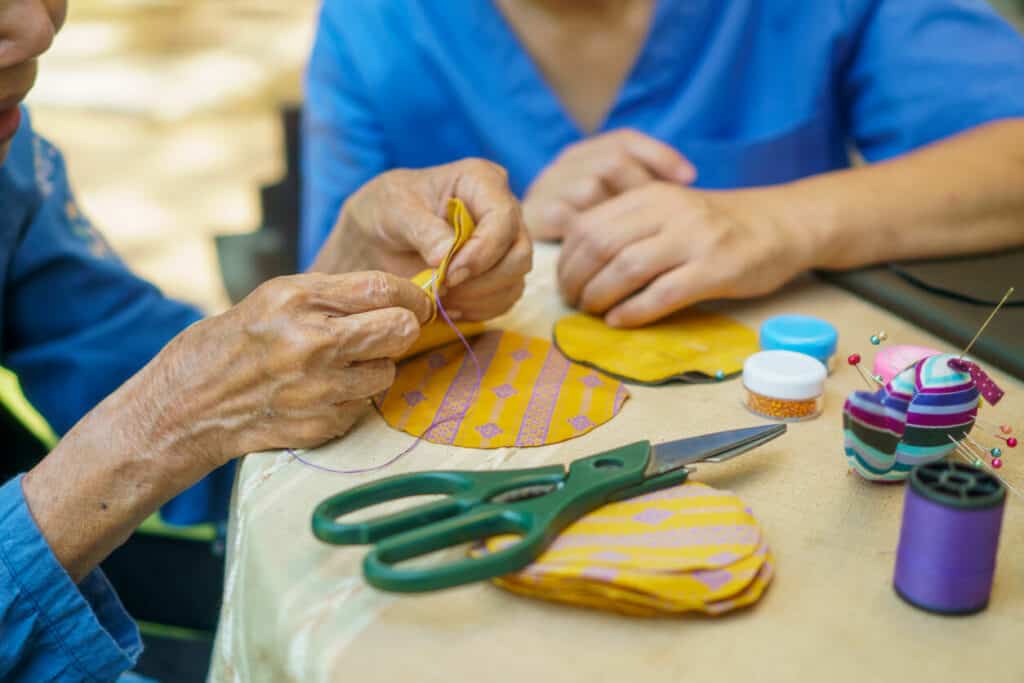
You might have observed that your elderly loved ones often struggle with performing daily living activities independently, like dressing, eating, or reading, due to physical or cognitive limitations. They might need your support to even put on a shirt. Being dependent on others can make them feel low and stressed. If you’re looking for an ideal way to help your senior family member achieve adequate independence in their life and feel happy, senior occupational therapy is your answer.
Occupational therapy helps people maintain their independence, mobility, and overall well-being. But how do you find a truly exceptional occupational therapist for your loved one? In this blog, we’ll explore the traits of a good occupational therapist and different ways of finding one for your elderly.
What Does a Senior Occupational Therapist Do?
Senior occupational therapists are healthcare practitioners who work with older people having physical, developmental, or cognitive disabilities, diseases, or injuries and find ways for them to perform daily living tasks. Being able to perform meaningful activities on their own makes older people confident and happy and positively impacts their overall health.
Geriatric occupational therapists also recommend home modifications that help older adults perform tasks without any hurdles to avoid the risk of falls and accidents. They suggest mobility aids and equipment suitable for an independent lifestyle and teach the elderly how to use them properly.
They also assess the patient, their strengths, and limitations and identify important activities that a person must perform every day. Then, they suggest alternative ways, assistive technologies, and environmental modifications for seniors to carry on various tasks without causing further injury.

Physical Therapy vs. Occupational Therapy for Older Adults
People often confuse occupational therapy with physical therapy. Although both benefit people by improving their quality of life and promoting an independent lifestyle, they have some clear differences that are presented below:
| Factor | Physical Therapy | Occupational Therapy |
|---|---|---|
| Area of Focus | Focuses on moving the body and improving physical functioning and range of movements | Emphasizes how to perform meaningful daily living activities |
| Goal of Intervention | Mobility, rehabilitation, and pain management | Self-care, productivity, and performance in daily life |
| Treatment Techniques | Exercise, manual therapy, and other therapeutic modalities | Adaptive equipment, assistive technology, and task modifications |
| Scope of Practice | Acute or chronic conditions, injuries, or disabilities affecting the physical function of a person | Physical, mental, developmental, and cognitive ailments affecting daily living |
Traits of a Good Occupational Therapist for Seniors
When you vet an occupational therapist for your elderly, there are some traits that you should look out for to ensure exceptional care delivery. A good occupational therapist should possess a unique blend of professional expertise and interpersonal skills to provide personalized care to meet their patient’s unique needs.
Here are a few traits that a good occupational therapist for elderly individuals should have.
Experience and Training
All occupational therapists do not work exclusively for seniors. Some specialize in children’s needs, so you’d want to choose a therapist who has experience working on issues of the geriatric population.
If an occupational therapist has experience with the elderly, they will correctly identify the challenges and limitations your elderly loved one faces or may face in the future and develop effective treatment and prevention strategies.
It is also significant for an occupational therapist to have the appropriate education and training. They should have completed an accredited occupational therapy program and be licensed in their state of practice. Continuing education is also essential, as it allows the therapist to stay up-to-date with the latest advancements in their practice.
Empathy and Compassion
In healthcare, empathy, and compassion are particularly valued due to the nature of the job. Since an occupational therapist deals with various ailments, including physical, psychological, and emotional challenges, an OT must be considerate and kind towards their patient.
A compassionate therapist can provide emotional support and a listening ear, which is just as vital as the therapy itself. Elderly patients are more likely to get attached and work easily if their occupational therapists are more sympathetic. It builds a strong bond between both sides, essential to a successful treatment.
Patience
When it comes to senior care, patience makes all the difference. Seniors suffer from a variety of cognitive and physical disabilities with age. They can quickly get confused, frustrated, or distracted during therapy.
Occupational therapists should be tolerant toward elderly patients. Instead of taking poor behaviors personally and reciprocating with a negative attitude, if the therapist acts with patience and understanding, the elderly will eventually develop an interest in the treatment and show improvement.
Communication Skills
Communication is a crucial component of occupational therapy as it builds a level of understanding between the therapist and the senior patient and ensures the patient’s adherence to the treatment plan.
A well-trained occupational therapist can communicate clearly and effectively with your loved ones, using language that is easy to understand and suited to their cognitive abilities. They take the time to listen carefully to their patient’s concerns and feedback and address them in a respectful, supportive manner.
Person-Centered Approach to Treatment
A person-centered approach respects the views and preferences of the elderly and their caregivers. It also makes the elderly feel they’re in control of their occupational therapy program.
The therapist needs to engage with the patient and the caregivers to find ways to overcome any existing treatment barriers. An excellent senior occupational therapist involves the older adults in the decisions and knows their abilities and strengths. It allows them to develop a therapy plan that focuses more on what they can do, improving their independence level.
Openness to New Medical Interventions
The healthcare field is constantly evolving, with evidence for new interventions and technologies always emerging. For instance, certain smartphone apps, robotic devices, and virtual assistive technology show evident results in occupational therapy for the elderly.
A good therapist must be open to new developments in their practice and be willing to incorporate the latest evidence-based interventions, which may be more effective than the traditional ones.
Organizational Skills
Organization skills are another pivotal trait of an efficient occupational therapist. They may be working with multiple patients at once, each with their own treatment plan, progress notes, and scheduling needs.
Organized OTs manage these competing demands effectively and ensure that each patient receives the care they need on time and consistently. Being organized also helps the occupational therapist to keep accurate records, which is vital for tracking the patient’s improvement over time and making informed decisions.
Team up with Other Health Care Professionals
A good senior occupational therapist should be comfortable working as part of the healthcare team. This includes collaborating with other healthcare professionals, such as physicians, nurses, social workers, and physical therapists, to ensure your loved ones receive comprehensive, coordinated care.
Their collaboration with the rest of the team helps them stay up-to-date with the elderly’s health status and enables them to adjust therapy for better results.

How Can You Find a Good Senior Occupational Therapist
This could be your first time hiring a senior occupational therapist for your loved one, and you might need help finding one. To help you out, we have listed a few options for finding an excellent occupational therapist for seniors.
- Referral from Your Physician
Your elderly’s physician is a great source of information when finding a good senior occupational therapist. Through coordinated care, physicians can share some medical information needed for a successful treatment plan and collaborate with an occupational therapist to ensure patients receive the best care.
Ask your doctor if they can refer you to someone who specializes in working with seniors. They would also inform you about the referred therapist’s experience and reputation.
- Online Research
You can also search the internet for an experienced occupational therapist in your area.
Many OTs have their own websites where you can find information about their training, experience, and the services they offer. You can also check online directories and professional organizations that list occupational therapists and their contact information.
Read online reviews and ratings from their previous clients to get an idea of the therapist’s quality of services. However, all online reviews may not be reliable, so it’s best to read several reviews from different sources before making a decision.
- Recommendations from Family and Friends
Someone from your family and friends might have worked with a senior occupational therapist for their loved ones. They can provide first-hand information about the therapists they have worked with, their personalities, communication style, and effectiveness.
Ask them as many questions to know about their experience with the therapist, such as how long they worked with them, what kind of progress they made, and how satisfied their loved ones were with the therapist. Remember that everyone’s needs differ, so what worked for someone else may not work for your loved one.
- Visiting Local Rehabilitation Centers
Your nearby rehabilitation centers or hospitals may have their own occupational therapist. So, you can also reach out to them to see if their services match your loved one’s needs. These centers typically have a team of occupational therapists specializing in different areas, including geriatrics care. So, it is highly likely that you will find an occupational therapist for your senior family member.
Talk to the therapist directly and get a feel for their treatment approach and methods. Ask the hospital or clinic staff for recommendations based on your loved one’s needs. You can also observe how the center is run and what equipment and facilities are available for the patient’s use. If you need in-home therapy for your senior, discuss it with them and see if they provide in-home services.
- Senior Care Agencies
Many senior care agencies specialize in providing various healthcare services for seniors, such as emergency care, physical therapy, and occupational therapy. Such agencies keep a network of licensed and experienced occupational therapists.
If you’re seeking a range of senior care services from an agency for your elderly, they might be able to help you. Senior care agencies like Amy’s Eden also provide occupational therapy in their assisted homes around Nevada for older adults who need such service. They also have caregivers to help handle administrative tasks, such as scheduling of sessions and paperwork required for elderly occupation therapy, making the process easier for you.

Questions to Ask When Interviewing an Occupational Therapist for the Elderly
When choosing a senior occupational therapist, you should consider asking these questions to pick the right person for your loved ones:

- Tell me about your education and training.
This is a basic yet crucial question to understand the education, certifications, and expertise of a senior occupational therapist. It ensures that the therapist has received the required education and training to work with elderly patients and has the knowledge and skills to provide adequate care.
Asking this question also helps you understand their approach to therapy and their level of expertise in their specialization, such as in geriatric care or patients with specific conditions.
- Do you have experience dealing with older adults? What kind of conditions have you treated?
Since older adults have unique needs, an occupational therapist must have some past experience working in geriatric care. You should ask them about the type of conditions they have treated to ensure they can provide the best care.
For example, if an elderly patient is diagnosed with dementia, it is recommended to choose an OT with experience treating dementia patients.
- What is your approach to involving caregivers (family and hired) in your patient’s care plan?
A caregiver, be it a family member or hired help, is directly involved in assisting and improving a senior’s quality of life. Engaging them in the patient’s care plan guarantees the continuity of care and treatment progress.
So, it is important to choose an occupational therapist who recognizes the significance of involving caregivers and involves them in the patient’s recovery journey.
- How do you assess the elderly to create a tailored treatment plan?
There is no one-size-fits-all when treating elderly patients, as each one has a unique set of needs. A generalized plan of care may not work for everyone. Ask your therapist how they create a care plan specific to your elderly’s needs.
You should also ensure that your chosen senior occupational therapist thoroughly assesses the patient’s functional limitations and develops an individualized treatment plan.
- Do you include self-activities for elderly patients to perform at home?
Ask the occupational therapist about their approach to including self-activities for the elderly to ensure continuity of care between therapy sessions. These activities should be adapted to the patient’s abilities and limitations so seniors can perform them safely and effectively.
- How do you set goals for treatment and measure the progress?
Talk to your loved one’s occupational therapist about their short- and long-term treatment goals and how they plan to measure the progress. The occupational therapist must communicate these goals with the caregivers.
It will also help you assess whether the occupational therapist is genuinely interested in setting realistic goals or just trying to impress you.
- How do you involve older adults in the treatment process and ensure they are comfortable with your interventions?
Your senior loved ones may have fears or concerns that may make therapy sessions uncomfortable. Make sure you choose a senior occupational therapist with an approachable and inclusive style of therapy so your loved one feels comfortable and involved in the process.
- What is your availability like? Do you accommodate patients who need more frequent or urgent sessions?
You also need to discuss the occupational therapist’s availability while interviewing them. You may need an elderly occupational therapist more frequently. Talk to them if they provide in-home services. Inquire about their policy for canceling and rescheduling sessions. Knowing this information allows your elderly loved ones to receive consistent and reliable care.

Conclusion
Occupational therapy for seniors improves their quality of life and makes them independent, confident, and happy. An occupational therapist who treats older adults knows how to make your loved one utilize their strengths to carry out their daily living activities without less stress.
To find a suitable senior occupational therapist, seek referrals from healthcare professionals, do online research, ask your family and friends, and visit nearby hospitals. When you shortlist occupational therapists, ask them all the right questions to choose the right professional for your loved ones.




